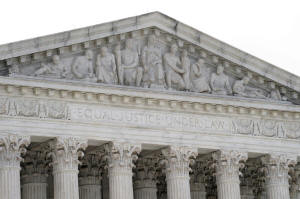Voting rights and Breyer's future in spotlight at U.S. Supreme Court
 Send a link to a friend
Send a link to a friend
 [July 01, 2021]
By Andrew Chung and Lawrence Hurley [July 01, 2021]
By Andrew Chung and Lawrence Hurley
WASHINGTON (Reuters) - As it races to
complete its current term, the U.S. Supreme Court on Thursday is poised
to rule on the legality of two Republican-backed voting restrictions in
Arizona while observers await word on whether the oldest of the nine
justices, Stephen Breyer, will announce plans to retire or remain on the
bench.
The court is scheduled to issue rulings at 10 a.m. ET (1400 GMT), with
two cases from its nine-month term remaining to be decided. The second
one focuses on California's requirement that tax-exempt charities
disclose to the state the identity of their top financial donors.
Breyer, who is 82 and has served on the court since 1994, has faced
calls from some liberal activists to step down to enable Democratic
President Joe Biden to appoint a younger liberal jurist to a lifetime
post on the nation's top judicial body. He has not given any public
indication about his plans.
The term was the first for Justice Amy Coney Barrett, who was appointed
by Republican former President Donald Trump, pushing the court further
to the right with a 6-3 conservative majority. Barrett joined the court
in October, replacing liberal Justice Ruth Bader Ginsburg, who died the
previous month.

The voting rights dispute involves two ballot restrictions in Arizona in
a case that gives the conservative justices a chance to further limit a
landmark 1965 federal law that bars racial discrimination in voting.
At issue are a 2016 state law that made it a crime to provide another
person's completed early ballot to election officials, with the
exception of family members or caregivers, and a separate longstanding
policy that discards ballots cast in-person at the wrong precinct.
The ruling will be closely watched in light of a spree of new voting
restrictions passed by Republican legislators in various states
following former President Donald Trump's false claims that the 2020
election was stolen from him through widespread voting fraud.
The San Francisco-based 9th U.S. Circuit Court of Appeals in 2020 found
that Arizona's measures had unlawfully burdened Black, Latino and Native
American voters in violation of the Voting Rights Act.
The restrictions were challenged by voting rights advocates and
Democrats. The Arizona Republican Party and the state's Republican
attorney general, Mark Brnovich, appealed the 9th Circuit's ruling.
[to top of second column]
|

A view shows the pediment of the U.S. Supreme Court building in
Washington, D.C., U.S. June 25, 2021. REUTERS/Ken Cedeno/File Photo

Democrats have accused Republicans at the state level
of enacting voter-suppression measures to make it harder for racial
minorities who tend to support Democratic candidates to cast
ballots.
The case also raised questions over whether fraud must be documented
in order to justify new curbs. Many Republicans have justified new
restrictions as a means to reduce voting fraud, a phenomenon that
election experts have said is rare in the United States.
Republicans are seeking to regain control of the U.S. Congress from
the Democrats in the 2022 mid-term elections.
At issue in the case is a specific section of the Voting Rights Act
that bans voting policies or practices that result in racial
discrimination. It has been the main tool used to show that voting
curbs discriminate against minorities since the Supreme Court in
2013 gutted another section of the statute that determined which
states with a history of racial discrimination needed federal
approval to change voting laws.
In the donor disclosure case, Democratic-governed California, the
most populous U.S. state, has said the donor information is required
as part of the state attorney general's duty to prevent charitable
fraud.
Two conservative nonprofit groups challenged the requirement: the
Thomas More Law Center, a conservative Catholic legal group, and the
Americans for Prosperity Foundation, which funds education and
training on conservative issues.
They said their donors could face harassment or threats if their
identities are made public. The 9th Circuit in 2018 reversed a
federal judge's ruling in favor of the groups, prompting them to
appeal to the Supreme Court.

(Reporting by Lawrence Hurley in Washington and Andrew Chung in New
York; Editing by Will Dunham)
[© 2021 Thomson Reuters. All rights
reserved.] Copyright 2021 Reuters. All rights reserved. This material may not be published,
broadcast, rewritten or redistributed.
Thompson Reuters is solely responsible for this content. |